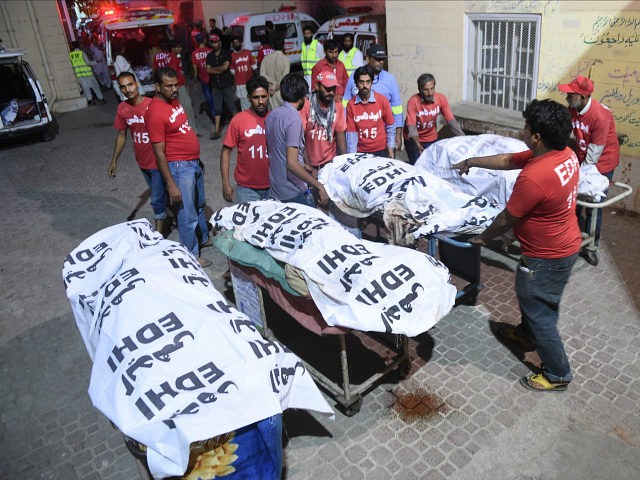A massive suicide bombing by the Islamic State (ISIS/ISIL) on a prominent Sufi Muslim shrine in Pakistan killed up to 88 people, including women and children, and wounded more than 300 others — a rude reminder of the terrorist group’s expanding presence in the region.
On Thursday night, the Islamic State suicide bomber targeted the Lal Shahbaz Qalandar shrine in southern Pakistan’s Sindh province, “frequented by the faithful of many sects of Islam but the majority of the worshippers are Shiite Muslims,” notes the Associated Press (AP), adding:
The Islamic State group, claiming responsibility for the attack in a statement circulated by its Aamaq news agency, said it targeted a “Shiite gathering.” The Sunni extremist group views Shiites as apostates and has targeted Pakistan’s Shiite minority in the past. It also views Sufi shrines as a form of idolatry.
…
On Friday, authorities raised the death toll to 88 after some of the critically wounded died. The Sindh provincial health department said a total of 343 people were wounded in the attack but that most were discharged after treatment while 76 still remain in hospitals.
Among the dead are at least 20 women and nine children.
“Local TV showed graphic footage of the aftermath of the blast, with wounded worshippers crying out for help and the floors covered with shoes, blood and body parts. Women cried and beat their chests in grief,” notes AP.
On the same day of the suicide attack in Pakistan, the ISIS branch in the Afghanistan-Pakistan region, known as the Khorasan Province (ISIL-K/IS-KP), also killed at least 18 soldiers at an Afghan army post in Nangarhar province. Thursday’s death toll at the hands of the terrorist group surpassed 100.
The U.S. military has identified the opium-rich Afghan province of Nangarhar, located on the country’s border with Pakistan, as ISIL-K’s stronghold in the region.
Located in the town of Sehwan in Sindh province, the shrine targeted by ISIS honors the 13th-century mystic Sufi holy figure Usman Marwandi, also known as Lal Shahbaz Qalander.
The shrine is considered Pakistan’s most revered Sufi holy site and attracts up to a million visitors each year.
Reuters reports:
With its ancient hypnotic rituals, Sufism is a mystical form of Islam that has been practised in Pakistan for centuries.
Men and women beating drums, waving their arms and swirling together as they practice the dhamaal are a common Thursday night spectacle at the Lal Qalandar shrine.
But such rituals make Sufis an increasingly obvious target of Sunni militants who consider them heretics.
Many Pakistani Sufis interviewed by Reuters vowed to keep going to the shrine to express their faith in the wake of the deadly attack.
In response to the incident, the Pakistani military reportedly followed through on its threat to seek “revenge” against the jihadist group in its Nangarhar province stronghold.
“Pakistan fired a blistering round of artillery shells into Afghan territory on Friday and shut down the Torkham border crossing, a key commercial artery between the two neighbors,” reports CBS News.
The Torkham international border crossing connects Afghanistan’s Nangarhar province with Pakistan’s Federally Administered Tribal Areas (FATA) and Khyber Pakhtunkhwa, considered a terrorist hotbed.
“Meanwhile, raids overnight across Pakistan targeted militant hideouts and led to shootouts with insurgents that left at least 39 suspects dead, according to three Pakistani security officials who spoke on condition of anonymity under regulations,” points out CBS News.
After the attack on the shrine, Pakistan’s army chief Gen. Qamar Javed Bajwa declared, “Each drop of nation’s blood shall be revenged, and revenged immediately. No more restraint for anyone.”
Fear of being added to the list of terrorism-linked countries covered by President Donald Trump’s executive order limiting immigration has reportedly prompted Pakistan to crack down on jihadist groups.
The Pentagon, Afghanistan, and India have long accused Pakistan of serving as a sanctuary for terrorist groups fighting U.S. troops in Afghanistan.
CBS News described Thursday’s suicide bombing by the Islamic State (IS) as “Pakistan’s deadliest in years,” adding that it “stunned the nation and raised questions about the authorities’ ability to rein in militant groups despite several military offensives targeting militant hideouts.”
“The [Pakistani] government has downplayed the IS affiliate, insisting that only a small number of militants have pledged allegiance to the group,” it adds.

COMMENTS
Please let us know if you're having issues with commenting.